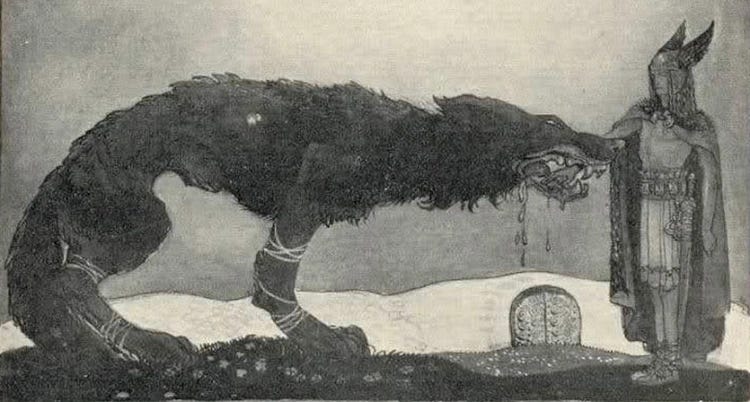Hi, friends,
I am cosmically tired. So today, not a letter but a list.
I’m still thinking a lot about language.
About how the way home—back to deep, rooted relationship with ourselves, each other, and the living world—might be found in language. Or, at least partly in language.
Maybe this idea shouldn’t be such a revelation to me. I’m a writer, after all.
But sometimes I’ve worried that I write and read not because it makes me feel more at home in the world, but because it takes me away from the world.
That’s definitely one way to use words.
But it’s becoming increasingly clear to me that language itself is asking to be used another way.
For instance: you can say “Tuesday” and mean, “Utterly mediocre day of possible remaining serotonin debt, second of five days of being inhumanely shocked awake in the lingering dark then eating a terrible sandwich at your desk at 10.45am because you’re too depressed to wait for lunchtime.”
Or you can say “Tuesday” and remember the old English god Tiw, the English variation of the Norse Tyr, likely derived from the very early Sky Father Tiwaz, equivalent to the Sanskrit Dyaus, Greek Zeus, and Roman Jovis. Slow down, and you might feel a sky god still whispering his power into every Tuesday.
There are secret worlds and histories hidden in so many of the words we use every day. What if we started to mean the deepest levels of the things we say? What kind of reality might that open up?
Next time you use any one of these words, try thinking of it as a key to the otherworld:
Weird: This is my favourite etymology. “Weird” derives from the Old English wyrd, meaning fate, destiny. It later came to mean uncanny or supernatural—think of the Weird Sisters in Macbeth. The fact that we’ve devalued it to mean simply out of the ordinary reveals the short shrift we give to the more-than-human powers at work in the world. Next time you describe something as “weird”, let yourself feel a shiver of humility: how blessedly small you are; how subject to mysterious forces; how likely to be living out a destiny you had no hand in choosing.
Morning: Some sources say that “morn” comes from the Proto-Indo-European mer, meaning “to blink or twinkle”. When you set your alarm for the morning, you’re making sure you’ll be awake for the day’s twinkling.
Day: Some sources attribute this to the Proto-Indo-European dhegh, meaning “to burn”. Which makes each spell from sunrise to sunset not a desert of obligations you must drag yourself through in order to be allowed to go back to bed. No. It’s a burning. It’s a blaze of life, of which you only get a finite number.
Bead: The word “bead” comes from the Old English biddan, meaning to ask or beg, and the derivative gebiddan, meaning to pray. Each bead on a Rosary was a prayer. When you drop a bead of sweat, your body is producing little pearls of prayer. What is it praying for?
Goodbye: It’s no secret that this is an abbreviation of “god be with you”—but when was the last time you said that and meant it?
Believe: Belief isn’t just about confidence; it’s an act of love. The “lieve” part of the word comes from the Proto-Indo-European leubh, meaning “to care, desire, love”. To believe in something is to love it, whether it’s your friend, your spouse, god, or all the more-than-human forces at work in the world.
Record: This one is almost too beautiful for me to bear. The “cord” here is from the Latin “cor”, meaning “heart”. Traditionally, the heart has been conceived as the seat of memory. So to record something is to restore it to your heart. Think about that next time you slip your phone out to grab a photo or voice note. Everything we record is lodged in our hearts, whether we’re aware of it or not. Perhaps it’s time to be more intentional about what we take in.
If you know any more such words, I’d love to read them in the comments. And for more of my thoughts on language and its many dimensions, see my earlier posts on the ancient Hebrew word ruach, among other words.
Love,
xx Ellie
PS. Some housekeeping: a couple of lovely people asked if they could support How to Go Home by subscribing, so I’ve turned paid subscriptions on. You’re welcome to pay to subscribe if you like, and I’d be honoured if you did—but it’s completely voluntary. Every post will still be free to all subscribers, paid or otherwise.



Wonderful to see your own and encouraging each of our own deepenings through language and intentionality. Thank you 🙏